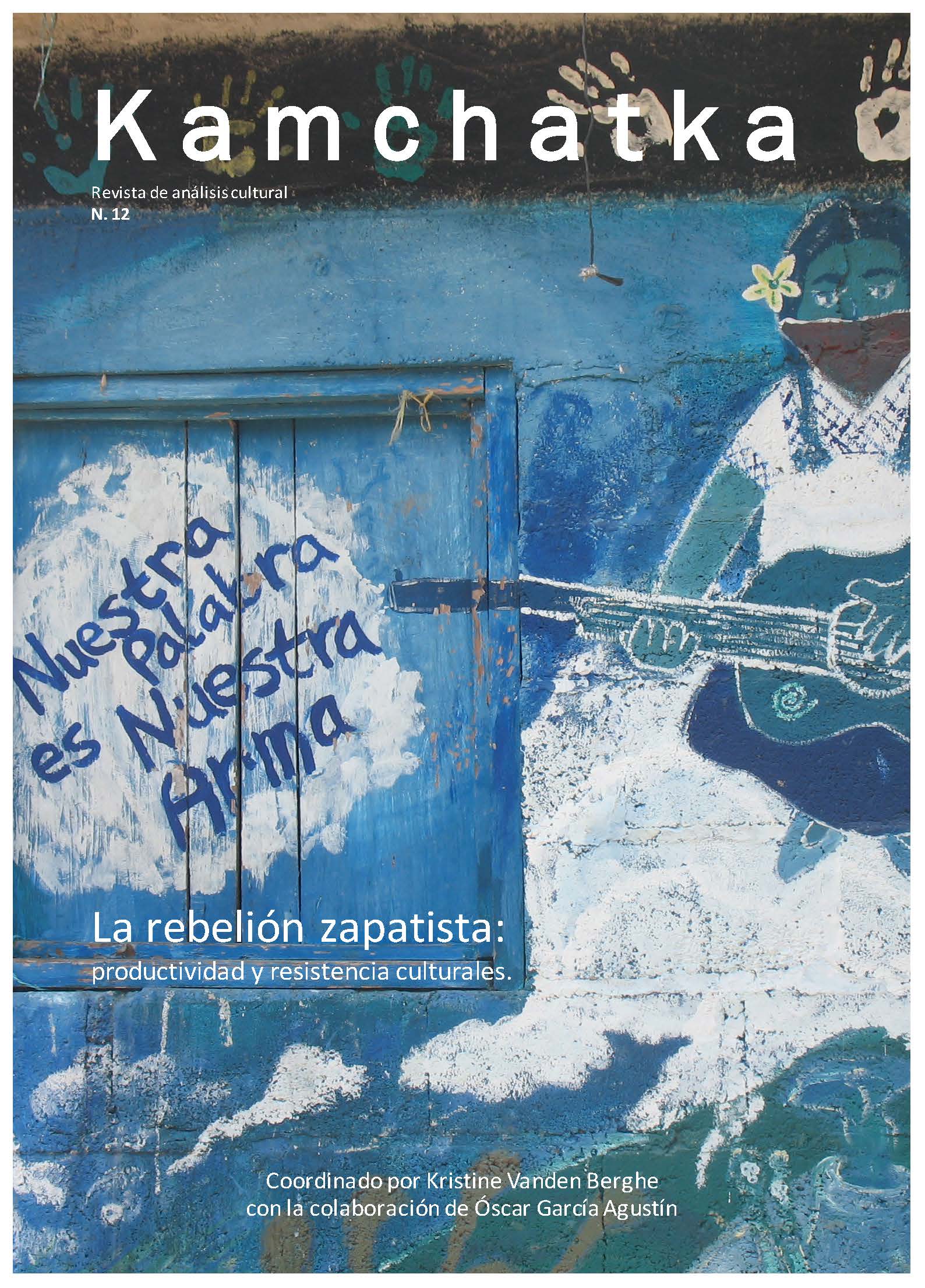El movimiento Zapatista: una cultura politica híbrida y paradójica
DOI:
https://doi.org/10.7203/KAM.12.12371Palabras clave:
EZLN, democracia, política híbrida, identidad, diálogo, nacionalismo, dignidad, neozapatismo Resumen
Resumen
Este artículo revela el carácter híbrido del movimiento zapatista (Ejército Zapatista de Liberación Nacional, EZLN) que salió a la luz el 1 de enero 1994 en protesta en contra del tratado libre de comercio (TLC) entre México, Canadá y EEUU que entró en vigor ese mismo día. El movimiento lanzó la lucha armada en contra del gobierno, bajo el eslogan ‘Nunca más un México sin nosotros’. En su declaración de la Selva Lacandona, declara la guerra al ejército federal mexicano. El movimiento hizo todo lo posible para evitar una clasificación fácil por lo cual todas las interpretaciones univocas como un movimiento social nuevo, o un movimiento neo-indígena o pan maya o una guerrilla tradicional resultaron, más bien, ser equívocas. Este articulo dará un repaso a estas interpretaciones y subraya el carácter híbrido del movimiento. Si lo híbrido era parte de una política consciente y intentada, este artículo también señalará una serie de paradojas no intentados pero que salieron a la luz como resultado de un análisis detenido del discurso Zapatista. Las reflecciones finales definen la importancia de este movimiento para el mundo entero y presenta sugerencias para la investigación futura.
 Descargas
Descargas
 Citas
Citas
Archer, Margareth S. (1995). Realist Social Theory: The Morphogenetic Approach. Cambridge: University Press.
Berger, Mark. “Romancing the Zapatistas: International Intellectuals and the Chiapas Rebellion”. Latin American Perspectives, 28(2) (2001): 149-170.
Brinkel, T. (2006). Nation Building and Pluralism. Experiences and Perspectives in State and Society in South Africa. Nijmegen: SDU.
Bruhn, Kathleen. “Antonio Gramsci and the Palabra Verdadera: The Political Discourse of Mexico’s Guerrilla Forces”. Journal of Interamerican Studies and World Affairs, 41(2) (1999): 29-55.
Canclini, Néstor (1995). Hybrid Cultures: Strategies for Entering and Leaving Modernity. University of Minnesota Press.
Chouliaraki, Lillie y Fairclough, Norman (1999). Discourse in Late Modernity. Rethinking Critical Discourse Analysis. Edinburgh: University Press.
Clifford, Bob (2005). The Marketing of Rebellion, Insurgents, Media and International Activism, Cambridge: University Press.
Díaz Polanco, Héctor (1998) La rebelión zapatista y la autonomía. México: Siglo XXI.
Fairclough, Norman (2003). Analysing Discourse. Textual Analysis for Social Research. London: Routledge.
Fairclough, Norman (2006). Language and Globalization. Abingdon/New York: Routledge.
Gilbreth, Chris y Otero, Gerardo. “Democratization in Mexico: The Zapatista Uprising and Civil Society”. Latin American Perspectives, 4(28) (2001): 7-29.
González Casanova, Pablo. “The Zapatista “Caracoles”. Networks of Resistance and Autonomy”. Socialism and Democracy, 19(3) (2005): 79-92.
Gosner, Kevin y Ouweneel, Arij (eds.) (1996). Indigenous Revolts in Chiapas and the Andean Highlands, Amsterdam: CEDLA.
Gutiérrez, Natividad (1999). Nationalist Myths and Ethnic Identities. Indigenous Intellectuals and the Mexican State. Lincoln, London: University of Nebraska Press.
Habermas, Jürgen. “New Social Movements”. Telos, 49 (1981): 33-37.
Harvey, Neil (1999). The Chiapas Rebellion. The Struggle for Land and Democracy. Durham, London: Duke University Press.
Henck, Nick. “Subcommander Marcos’ Discourse on Mexico’s Intellectual Class”. Asian Journal of Latin American Studies, 25(1) (2012): 35-73.
Hernández Castillo, Rosalva (2001). La otra frontera: identidades múltiples en el Chiapas poscolonial, México: Ciesas.
Higgins, Nicholas P. (2004). Understanding the Chiapas Rebellion. Modernist Vision and The Invisible Indian. Austin: University of Texas Press.
Holloway, John y Peláez, Eloína (eds.) (1998). Zapatista! Reinventing Revolution in Mexico. London: Pluto Press.
Huffschmid, Anne (2004). Diskursguerilla: Wortergreifing und Widersinn. Die Zapatistas im Spiegel der mexikanischen und internationalen Öffentlichkeit. Heidelberg: Synchron Publishers GmbH.
Johnston, Josée. “Pedagogical guerrillas, armed democrats, and revolutionary counterpublic: Examining paradox in the Zapatista unprising in Chiapas Mexico”. Theory and Society, 29 (2000): 463-505.
Kampwirth, Karen. “Creating Space in Chiapas: An Analysis of the Strategies of the Zapatista Army and the Rebel Government in Transition”. Bulletin of Latin American Research, 15(2) (1996): 261-267.
Laclau, Ernesto (1996/2007). Emancipations. London: Verso.
Laclau, Ernesto y Mouffe, Chantal (1985). Hegemony and Socialist Strategy. Towards a Radical Democratic Politics, London: Verso.
Le Bot, Yvon (1997). Subcomandante Marcos. El sueño zapatista. Barcelona: Plaza y Janés.
Leyva Solano, Xochitl (1998). “The New Zapatista Movement: Political Levels, Actors and Political Discourse in Contemporary Mexico”. Encuentros Antropológicos: Power, Identity and Mobility in Mexican Society. London: Institute of Latin American Studies.
Mattiace, Shannan (2003). To see with two eyes. Peasant activism and Indian autonomy in Chiapas, Mexico, Albuquerque: University of New Mexico Press.
Millán, Márgara (1998). “Zapatista Indigenous Women”. Holloway, John y Peláez, Eloína (eds.). Zapatista! Reinventing Revolution in Mexico. London: Pluto Press: 64-80.
Montesano Montessori, Nicolina (2009). An analysis of a struggle for hegemony in Mexico: the Zapatista Movement versus President Salinas de Gortari. Saarbrücken: VDM.
Montesano Montessori, Nicolina. “The design of a theoretical, methodological, analytical framework to analyse hegemony in discourse”. Critical Discourse Studies, 8 (2011): 169-181.
Montesano Montessori, Nicolina. “Un análisis discursivo comparativo entre las narrativas del Ejército Zapatista de Liberación Nacional (EZLN) y del ex presidente Salinas de Gortari”. Sociolinguistic Studies, 7(3) (2013): 293–320.
Montesano Montessori, Nicolina (2014). “The potential of narrative strategies in the discursive construction of hegemonic positions and social change”. Kaal, B.; Maks, I. y Van Elfrinkhof, A. (eds.). From Text to Political Positions State-of-the-art approaches to estimating party positions. Amsterdam: John Benjamins: 171-188.
Montesano Montessori, Nicolina (2016). “Why Complexity Matters”. Bakker, C. y Montesano Montessori, N. (eds.). Complexity in Education. From Horror to Passion. Rotterdam: Sense: 261-282.
Mouffe, Chantal (1993/2005). The Return of the Political. London, New York: Verso.
Nash, June. “The Reassertion of Indigenous Identity: Mayan Responses to State intervention in Chiapas”. Latin American Research Review, 30(3) (1995): 7-41.
Nash, June. “The Fiesta of the Word. The Zapatista Uprising and Radical Democracy in Mexico”. American Anthropologist, 99(2) (1997): 261-274.
Nuijten, Monique y Van der Haar, Gemma. “The Zapatistas of Chiapas: Challenges and Contradictions. Review Essay by Monique Nuijten and Gemma van der Haar”. Revista Europea de Estudios Latinoamericanos y del Caribe, 68 (2000): 83-90.
Olesen, Thomas (2005). International Zapatismo. The Construction of Solidarity in the Age of Globalization. London: Zed Books.
Otero, Gerardo (ed.) (2004). Mexico in Transition Neo-liberal Globalism, the State and Civil Society. Nova Scotia: Fernwood Publishing, London/New York: Zed Books.
Pansters, Will. “Authenticity, Hybridity, and Difference: debating national identity in twentieth-century Mexico”. Focaal–European Journal of Anthropology 45 (2005): 71-93.
Pitarch, Pedro. “The Zapatistas and the art of ventriloquism”. Journal of Human Rights 3(3) (2010): 291-312.
Reisigl, Martin y Wodak, Ruth (2001). Discourse and Discrimination. Rhetorics of Racism and Antisemitism. London: Routledge.
Rovira Sancho, Guiomar. “El Zapatismo y la red transnacional”. Razón y Palabra, 47 (2005).
Van der Haar, Gemma. “Land Reform and the Zapatista Uprising”. Journal of Peasant Studies, 32(3) (2005): 484-507.
Vanden Berghe, Kristine (2005). Narrativa de la Rebelión Zapatista. Madrid/Frankfurt: Vervuert/Iberoamericana.
Womack, John (1999). Rebellion in Chiapas. An Historical Reader, New York: New Press.
Descargas
Publicado
Cómo citar
-
Resumen3066
-
Artículo1915
Número
Sección
Licencia
Los textos publicados en esta revista están –si no se indica lo contrario– bajo una licencia Reconocimiento-NoComercial 4.0 de Creative Commons. Puede copiarlos, distribuirlos y comunicarlos públicamente siempre que cite su autor y el nombre de esta publicación, Kamchatka. Revista de análisis cultural y no los utilice para fines comerciales. La licencia completa se puede consultar en Creative Commons.
Aquellos autores/as que tengan publicaciones con esta revista, aceptan los términos siguientes:
- Los autores/as conservarán sus derechos de autor y garantizarán a la revista el derecho de primera publicación de su obra, el cuál estará simultáneamente sujeto a la Licencia de reconocimiento no comercial de Creative Commons que permite a terceros compartir la obra siempre que se indique su autor y su primera publicación esta revista.
- Los autores/as podrán adoptar otros acuerdos de licencia no exclusiva de distribución de la versión de la obra publicada (p. ej.: depositarla en un archivo telemático institucional o publicarla en un volumen monográfico) siempre que se indique la publicación inicial en esta revista.
- Se permite y recomienda a los autores/as difundir su obra a través de Internet (p. ej.: en archivos telemáticos institucionales o en su página web) antes y durante el proceso de envío, lo cual puede producir intercambios interesantes y aumentar las citas de la obra publicada.





